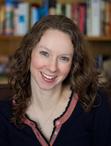Stephanie Morrill's Blog
September 17, 2018
We're not here! We're at GoTeenWriters.com
Hi, writers!
Today is the day! We've officially made our big move over to GoTeenWriters.com, and that's where you'll find our posts from here on out:
GoTeenWriters.com
See you there!
Today is the day! We've officially made our big move over to GoTeenWriters.com, and that's where you'll find our posts from here on out:
GoTeenWriters.com
See you there!
Published on September 17, 2018 04:00
September 10, 2018
Update on our move to GoTeenWriters.com
Hey, writers!
As I mentioned last week, we're in the process of moving the website off Blogger and onto a self-hosted site. Blogger was an excellent place for us to get started, but we need a self-hosted site to house all the dreams Shan, Jill, and I have for this community.
But moving 8 1/2 years of content onto a new site is very time-consuming. As in, I spent about 30+ hours doing it last week, and I think it's going to take the rest of this week as well.
We anticipate being back to blogging NEXT week, and I'll post the list of our fabulous 100-for-100 challenge finishers. There were so many!! Thanks for your patience during this process, and we'll see you at GoTeenWriters.com!
Stephanie
As I mentioned last week, we're in the process of moving the website off Blogger and onto a self-hosted site. Blogger was an excellent place for us to get started, but we need a self-hosted site to house all the dreams Shan, Jill, and I have for this community.
But moving 8 1/2 years of content onto a new site is very time-consuming. As in, I spent about 30+ hours doing it last week, and I think it's going to take the rest of this week as well.
We anticipate being back to blogging NEXT week, and I'll post the list of our fabulous 100-for-100 challenge finishers. There were so many!! Thanks for your patience during this process, and we'll see you at GoTeenWriters.com!
Stephanie
Published on September 10, 2018 11:10
September 3, 2018
Pardon our funkiness this week...
Hey, writers!
We're in the process of moving the Go Teen Writers website onto a self-hosted site rather than Blogger. It's going to mean some awkwardness this week during the transition, but we think the result will be worth it for us all. Thanks in advance for being patient with us, and we hope to be back to our normal blogging schedule next week!
In the meantime, happy writing!
Stephanie
We're in the process of moving the Go Teen Writers website onto a self-hosted site rather than Blogger. It's going to mean some awkwardness this week during the transition, but we think the result will be worth it for us all. Thanks in advance for being patient with us, and we hope to be back to our normal blogging schedule next week!
In the meantime, happy writing!
Stephanie
Published on September 03, 2018 05:53
August 31, 2018
Which stage of the writing process do you enjoy most: drafting or editing? (With Kim Culbertson!)
YOU GUYS! Today is the very last day of our 2018 Summer Panels! What a whirlwind we've had with so many fantastic authors who gave selflessly of their time to share with us. I hope you'll find them on the web and give them a big thank you.
Which brings me to our last panelist, Kim Culbertson. Hasn't she been wonderful this week? Here are a few places you can find her online. Please search her out and show some gratitude her for all she's given us.
Facebook | Twitter | Instagram | Website
Next week, the Go Teen Writers blog will be closed as Jill, Steph and I finish our preparations for fall and the final lap of our Grow An Author series. We'll be diving into mushy middles and working our way to a book's ending. I hope you'll join us.
But today, we're going to finish these panels with panache. Here's our final panel question:
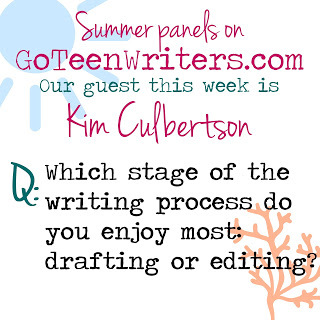
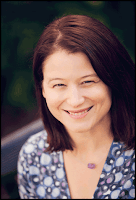 Kim: I struggle with first drafts. There is nothing quite as daunting as the blank page. During that first draft, I never really know yet what the book is about and I don’t know my characters yet – not deeply. So I love editing (which is a form of drafting – second drafts, third drafts). For me, revising is the best part of the process. I most love that middle place – where I have a couple of drafts but I’m still discovering things, I’m still unraveling the mystery of this particular book. The early draft and then the picky later phases of editing are my least favorite parts.
Kim: I struggle with first drafts. There is nothing quite as daunting as the blank page. During that first draft, I never really know yet what the book is about and I don’t know my characters yet – not deeply. So I love editing (which is a form of drafting – second drafts, third drafts). For me, revising is the best part of the process. I most love that middle place – where I have a couple of drafts but I’m still discovering things, I’m still unraveling the mystery of this particular book. The early draft and then the picky later phases of editing are my least favorite parts.
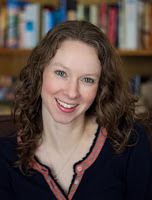 Steph: Ha. Whichever one I’m not doing, usually. In general, I think I find editing more fulfilling, but when I’m agonizing over word choices and sentence structure, I fondly remember those times when I’m writing my first draft and thinking, “That’s good enough. I’ll fix it in edits!”
Steph: Ha. Whichever one I’m not doing, usually. In general, I think I find editing more fulfilling, but when I’m agonizing over word choices and sentence structure, I fondly remember those times when I’m writing my first draft and thinking, “That’s good enough. I’ll fix it in edits!”
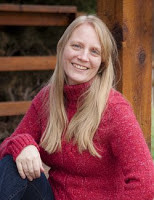 Jill: If I had to pick between drafting or editing, I choose editing. I love making a book better, but it can be a real struggle to get that messy first draft done. In all honesty, though, my very favorite part of the writing process is the brainstorming/worldbuilding stage. I love creating characters, drawing my map, coming up with different cultures and histories for each. It’s all dreaming, and the story can do no wrong at that point. Sure, it will reach the first draft stage at some point, in which I want to throw it in the trash, but during the brainstorming stage, it’s nothing but fun.
Jill: If I had to pick between drafting or editing, I choose editing. I love making a book better, but it can be a real struggle to get that messy first draft done. In all honesty, though, my very favorite part of the writing process is the brainstorming/worldbuilding stage. I love creating characters, drawing my map, coming up with different cultures and histories for each. It’s all dreaming, and the story can do no wrong at that point. Sure, it will reach the first draft stage at some point, in which I want to throw it in the trash, but during the brainstorming stage, it’s nothing but fun.
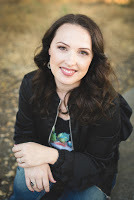 Shan: EDITING! I like having the story in place and working to improve on what's there. Although, there's a lot of truth in what Steph says. We often look fondly at the phase that isn't currently sucking the life out of us. I do want to point out something important here. Kim refers to editing as a form of drafting which isn't something I've actually considered before, but it makes perfect sense and serves to teach us this: we all use similar words when we're discussing the craft of writing, but those words can have different meanings to each of us. When you're trying to understand someone's process, you might have to set aside some of your own preconceived notions and hear the heart of what they're saying.
Shan: EDITING! I like having the story in place and working to improve on what's there. Although, there's a lot of truth in what Steph says. We often look fondly at the phase that isn't currently sucking the life out of us. I do want to point out something important here. Kim refers to editing as a form of drafting which isn't something I've actually considered before, but it makes perfect sense and serves to teach us this: we all use similar words when we're discussing the craft of writing, but those words can have different meanings to each of us. When you're trying to understand someone's process, you might have to set aside some of your own preconceived notions and hear the heart of what they're saying.
Now, you tell us! Which stage of the writing process do you enjoy most? Have you gotten past the drafting phase on any of your projects?
Which brings me to our last panelist, Kim Culbertson. Hasn't she been wonderful this week? Here are a few places you can find her online. Please search her out and show some gratitude her for all she's given us.
Facebook | Twitter | Instagram | Website
Next week, the Go Teen Writers blog will be closed as Jill, Steph and I finish our preparations for fall and the final lap of our Grow An Author series. We'll be diving into mushy middles and working our way to a book's ending. I hope you'll join us.
But today, we're going to finish these panels with panache. Here's our final panel question:

 Kim: I struggle with first drafts. There is nothing quite as daunting as the blank page. During that first draft, I never really know yet what the book is about and I don’t know my characters yet – not deeply. So I love editing (which is a form of drafting – second drafts, third drafts). For me, revising is the best part of the process. I most love that middle place – where I have a couple of drafts but I’m still discovering things, I’m still unraveling the mystery of this particular book. The early draft and then the picky later phases of editing are my least favorite parts.
Kim: I struggle with first drafts. There is nothing quite as daunting as the blank page. During that first draft, I never really know yet what the book is about and I don’t know my characters yet – not deeply. So I love editing (which is a form of drafting – second drafts, third drafts). For me, revising is the best part of the process. I most love that middle place – where I have a couple of drafts but I’m still discovering things, I’m still unraveling the mystery of this particular book. The early draft and then the picky later phases of editing are my least favorite parts. Steph: Ha. Whichever one I’m not doing, usually. In general, I think I find editing more fulfilling, but when I’m agonizing over word choices and sentence structure, I fondly remember those times when I’m writing my first draft and thinking, “That’s good enough. I’ll fix it in edits!”
Steph: Ha. Whichever one I’m not doing, usually. In general, I think I find editing more fulfilling, but when I’m agonizing over word choices and sentence structure, I fondly remember those times when I’m writing my first draft and thinking, “That’s good enough. I’ll fix it in edits!” Jill: If I had to pick between drafting or editing, I choose editing. I love making a book better, but it can be a real struggle to get that messy first draft done. In all honesty, though, my very favorite part of the writing process is the brainstorming/worldbuilding stage. I love creating characters, drawing my map, coming up with different cultures and histories for each. It’s all dreaming, and the story can do no wrong at that point. Sure, it will reach the first draft stage at some point, in which I want to throw it in the trash, but during the brainstorming stage, it’s nothing but fun.
Jill: If I had to pick between drafting or editing, I choose editing. I love making a book better, but it can be a real struggle to get that messy first draft done. In all honesty, though, my very favorite part of the writing process is the brainstorming/worldbuilding stage. I love creating characters, drawing my map, coming up with different cultures and histories for each. It’s all dreaming, and the story can do no wrong at that point. Sure, it will reach the first draft stage at some point, in which I want to throw it in the trash, but during the brainstorming stage, it’s nothing but fun. Shan: EDITING! I like having the story in place and working to improve on what's there. Although, there's a lot of truth in what Steph says. We often look fondly at the phase that isn't currently sucking the life out of us. I do want to point out something important here. Kim refers to editing as a form of drafting which isn't something I've actually considered before, but it makes perfect sense and serves to teach us this: we all use similar words when we're discussing the craft of writing, but those words can have different meanings to each of us. When you're trying to understand someone's process, you might have to set aside some of your own preconceived notions and hear the heart of what they're saying.
Shan: EDITING! I like having the story in place and working to improve on what's there. Although, there's a lot of truth in what Steph says. We often look fondly at the phase that isn't currently sucking the life out of us. I do want to point out something important here. Kim refers to editing as a form of drafting which isn't something I've actually considered before, but it makes perfect sense and serves to teach us this: we all use similar words when we're discussing the craft of writing, but those words can have different meanings to each of us. When you're trying to understand someone's process, you might have to set aside some of your own preconceived notions and hear the heart of what they're saying. Now, you tell us! Which stage of the writing process do you enjoy most? Have you gotten past the drafting phase on any of your projects?
Published on August 31, 2018 04:30
August 29, 2018
How much time do you spend on marketing in relation to how much time you spend on writing? (With Kim Culbertson!)
Hi all! Shannon here and we've got the amazing Kim Culbertson with us again today.
I wanted to give you a little glimpse into all of Kim's books this morning but there are so many! So, instead I'm going to share the summary for her latest book, The Wonder of Us. But, promise me you'll jump over to her website and give the others a look. Yes?
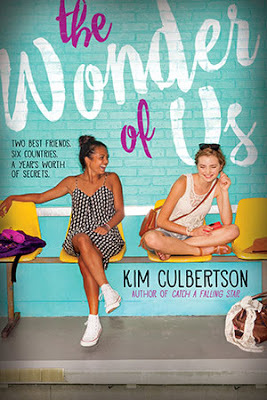 Riya and Abby are:Best friends.
Riya and Abby are:Best friends.
Complete opposites.
Living on different continents.
Currently mad at each other.
About to travel around Europe.
Riya moved to Berlin, Germany, with her family for junior year, while Abby stayed behind in their small California town. They thought it would be easy to keep up their friendship-it’s only a year and they’ve been best friends since preschool. But instead, they ended up fighting and not being there for the other. So Riya proposes an epic adventure to fix their friendship. Two weeks, six countries, unimaginable fun. But two small catches:
They haven’t talked in weeks.
They’ve both been keeping secrets.Can Riya and Abby find their way back to each other among lush countrysides and dazzling cities, or does growing up mean growing apart?
Doesn't it sound exciting? And a perfect summer read, right? Who doesn't want to travel Europe with Riya and Abby? I do!
But before we hop on a plane (or visit a bookstore!), let's tackle today's panel question. It's a doozy.
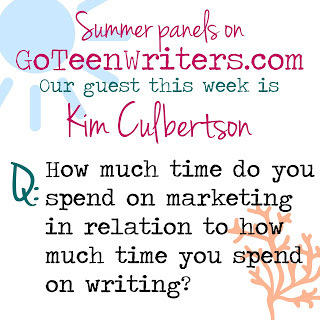
 Kim: I would say that when I’m promoting a book I spend about 20% of my writing time on marketing and social media and I would like to get that number down to 10% of my time. Social media is such a mixed bag for me because on one hand I love connecting with other writers and book lovers – it’s so essential to know this work I love is done by others who need characters and stories and words as much as I do. But social media can create a backlash of comparison and competition that can be destructive to the writing process and to a writer’s heart. Lately, I have really come into an understanding that writing and publishing are separate worlds and I have worked to build an emotional wall between them to protect my heart and my writing life. We can always find someone whose book is getting more attention or they seem like they are living a glamorous, amazing life, but then I remember that most of the time those pictures and posts tell only part of the story. I have to remember that social media is as much a construction as the fiction I’m writing. Also, I’ve realized over the years that I am actually a fairly private person who likes my quiet, small town life, and there are times social media presses too much into that world for my comfort level. It’s a constant balancing act.
Kim: I would say that when I’m promoting a book I spend about 20% of my writing time on marketing and social media and I would like to get that number down to 10% of my time. Social media is such a mixed bag for me because on one hand I love connecting with other writers and book lovers – it’s so essential to know this work I love is done by others who need characters and stories and words as much as I do. But social media can create a backlash of comparison and competition that can be destructive to the writing process and to a writer’s heart. Lately, I have really come into an understanding that writing and publishing are separate worlds and I have worked to build an emotional wall between them to protect my heart and my writing life. We can always find someone whose book is getting more attention or they seem like they are living a glamorous, amazing life, but then I remember that most of the time those pictures and posts tell only part of the story. I have to remember that social media is as much a construction as the fiction I’m writing. Also, I’ve realized over the years that I am actually a fairly private person who likes my quiet, small town life, and there are times social media presses too much into that world for my comfort level. It’s a constant balancing act.
 Steph: Years ago, I was chatting with agent Amanda Luedeke. Mostly about how awesome Jill Williamson is, but other stuff too. She said she recommended her clients split their time in half. Half the work time writing and half the work time marketing. I’ve found this works pretty well for me, other than intense seasons. Coming up on a deadline, my social media accounts get cobwebs because I’m focused on writing, and during a release season, I hardly ever write. But overall, the 50/50 balance works for me. I write first when I’m the freshest.
Steph: Years ago, I was chatting with agent Amanda Luedeke. Mostly about how awesome Jill Williamson is, but other stuff too. She said she recommended her clients split their time in half. Half the work time writing and half the work time marketing. I’ve found this works pretty well for me, other than intense seasons. Coming up on a deadline, my social media accounts get cobwebs because I’m focused on writing, and during a release season, I hardly ever write. But overall, the 50/50 balance works for me. I write first when I’m the freshest.
 Jill: I go in spurts. If I’m drafting a book, I don’t do much marketing at all. I “try” to do a little social media each day, even if it’s only to post an Instagram picture or ask my Facebook page a question, but I don’t succeed. And that’s okay. It’s hard work for me to come up with things to say. And Instagram, which so much fun, is desperately time consuming. Plus, I’m so introverted that social media just doesn’t come naturally to me. Now, If I’m gearing up for a book release, I’ll do much more social media and marketing. It will likely be 100% marketing for the two weeks before a book release and the week of a book release. And if it’s an indie project, I might even invest in some ads. All of that kind of stuff melts my brain, though, so I’ll make a calendar and plan everything out in advance. That way I won’t get overwhelmed worrying about what I’m forgetting. Then after the book release, I need some time to recover from all that scrambling to post things, so I might not do anything. Take a few days off. Then I ease back into writing. And a week or so later, try to ease back into a social media routine.
Jill: I go in spurts. If I’m drafting a book, I don’t do much marketing at all. I “try” to do a little social media each day, even if it’s only to post an Instagram picture or ask my Facebook page a question, but I don’t succeed. And that’s okay. It’s hard work for me to come up with things to say. And Instagram, which so much fun, is desperately time consuming. Plus, I’m so introverted that social media just doesn’t come naturally to me. Now, If I’m gearing up for a book release, I’ll do much more social media and marketing. It will likely be 100% marketing for the two weeks before a book release and the week of a book release. And if it’s an indie project, I might even invest in some ads. All of that kind of stuff melts my brain, though, so I’ll make a calendar and plan everything out in advance. That way I won’t get overwhelmed worrying about what I’m forgetting. Then after the book release, I need some time to recover from all that scrambling to post things, so I might not do anything. Take a few days off. Then I ease back into writing. And a week or so later, try to ease back into a social media routine.
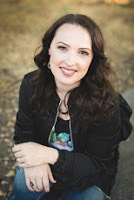 Shan: I don't know how to answer this question. But, let me say this: I love that Stephanie up there is following Jill's agent's advice and Jill so totally is not! That feels real and honest. As does Kim's answer. I feel the press of social media in much the same way. I go through seasons where I'm downright sick of myself--of talking about myself and reading about myself and posting about myself. I told this to my publicist once and she fired back with the truth that most of my readers aren't seeing everything I'm posting. Each post gives a reader a chance to find me and my books. That helped frame the task for me and I cling to that when I'm feeling over-saturated with SELF. It is such a balance because we MUST write. In reality, I'm a lot like Jill. It goes in spurts and stops for me. The only thing I'm consistent about is posting to Instagram and that's because it's a form of social media I enjoy. That might make it easier on some of you. Find a platform you enjoy and invest your energy there until you're brave enough to take on another.
Shan: I don't know how to answer this question. But, let me say this: I love that Stephanie up there is following Jill's agent's advice and Jill so totally is not! That feels real and honest. As does Kim's answer. I feel the press of social media in much the same way. I go through seasons where I'm downright sick of myself--of talking about myself and reading about myself and posting about myself. I told this to my publicist once and she fired back with the truth that most of my readers aren't seeing everything I'm posting. Each post gives a reader a chance to find me and my books. That helped frame the task for me and I cling to that when I'm feeling over-saturated with SELF. It is such a balance because we MUST write. In reality, I'm a lot like Jill. It goes in spurts and stops for me. The only thing I'm consistent about is posting to Instagram and that's because it's a form of social media I enjoy. That might make it easier on some of you. Find a platform you enjoy and invest your energy there until you're brave enough to take on another.
How about you? How much time do you spend on marketing? Is it more or less time than you spend on writing?
I wanted to give you a little glimpse into all of Kim's books this morning but there are so many! So, instead I'm going to share the summary for her latest book, The Wonder of Us. But, promise me you'll jump over to her website and give the others a look. Yes?
 Riya and Abby are:Best friends.
Riya and Abby are:Best friends.Complete opposites.
Living on different continents.
Currently mad at each other.
About to travel around Europe.
Riya moved to Berlin, Germany, with her family for junior year, while Abby stayed behind in their small California town. They thought it would be easy to keep up their friendship-it’s only a year and they’ve been best friends since preschool. But instead, they ended up fighting and not being there for the other. So Riya proposes an epic adventure to fix their friendship. Two weeks, six countries, unimaginable fun. But two small catches:
They haven’t talked in weeks.
They’ve both been keeping secrets.Can Riya and Abby find their way back to each other among lush countrysides and dazzling cities, or does growing up mean growing apart?
Doesn't it sound exciting? And a perfect summer read, right? Who doesn't want to travel Europe with Riya and Abby? I do!
But before we hop on a plane (or visit a bookstore!), let's tackle today's panel question. It's a doozy.

 Kim: I would say that when I’m promoting a book I spend about 20% of my writing time on marketing and social media and I would like to get that number down to 10% of my time. Social media is such a mixed bag for me because on one hand I love connecting with other writers and book lovers – it’s so essential to know this work I love is done by others who need characters and stories and words as much as I do. But social media can create a backlash of comparison and competition that can be destructive to the writing process and to a writer’s heart. Lately, I have really come into an understanding that writing and publishing are separate worlds and I have worked to build an emotional wall between them to protect my heart and my writing life. We can always find someone whose book is getting more attention or they seem like they are living a glamorous, amazing life, but then I remember that most of the time those pictures and posts tell only part of the story. I have to remember that social media is as much a construction as the fiction I’m writing. Also, I’ve realized over the years that I am actually a fairly private person who likes my quiet, small town life, and there are times social media presses too much into that world for my comfort level. It’s a constant balancing act.
Kim: I would say that when I’m promoting a book I spend about 20% of my writing time on marketing and social media and I would like to get that number down to 10% of my time. Social media is such a mixed bag for me because on one hand I love connecting with other writers and book lovers – it’s so essential to know this work I love is done by others who need characters and stories and words as much as I do. But social media can create a backlash of comparison and competition that can be destructive to the writing process and to a writer’s heart. Lately, I have really come into an understanding that writing and publishing are separate worlds and I have worked to build an emotional wall between them to protect my heart and my writing life. We can always find someone whose book is getting more attention or they seem like they are living a glamorous, amazing life, but then I remember that most of the time those pictures and posts tell only part of the story. I have to remember that social media is as much a construction as the fiction I’m writing. Also, I’ve realized over the years that I am actually a fairly private person who likes my quiet, small town life, and there are times social media presses too much into that world for my comfort level. It’s a constant balancing act. Steph: Years ago, I was chatting with agent Amanda Luedeke. Mostly about how awesome Jill Williamson is, but other stuff too. She said she recommended her clients split their time in half. Half the work time writing and half the work time marketing. I’ve found this works pretty well for me, other than intense seasons. Coming up on a deadline, my social media accounts get cobwebs because I’m focused on writing, and during a release season, I hardly ever write. But overall, the 50/50 balance works for me. I write first when I’m the freshest.
Steph: Years ago, I was chatting with agent Amanda Luedeke. Mostly about how awesome Jill Williamson is, but other stuff too. She said she recommended her clients split their time in half. Half the work time writing and half the work time marketing. I’ve found this works pretty well for me, other than intense seasons. Coming up on a deadline, my social media accounts get cobwebs because I’m focused on writing, and during a release season, I hardly ever write. But overall, the 50/50 balance works for me. I write first when I’m the freshest.
 Jill: I go in spurts. If I’m drafting a book, I don’t do much marketing at all. I “try” to do a little social media each day, even if it’s only to post an Instagram picture or ask my Facebook page a question, but I don’t succeed. And that’s okay. It’s hard work for me to come up with things to say. And Instagram, which so much fun, is desperately time consuming. Plus, I’m so introverted that social media just doesn’t come naturally to me. Now, If I’m gearing up for a book release, I’ll do much more social media and marketing. It will likely be 100% marketing for the two weeks before a book release and the week of a book release. And if it’s an indie project, I might even invest in some ads. All of that kind of stuff melts my brain, though, so I’ll make a calendar and plan everything out in advance. That way I won’t get overwhelmed worrying about what I’m forgetting. Then after the book release, I need some time to recover from all that scrambling to post things, so I might not do anything. Take a few days off. Then I ease back into writing. And a week or so later, try to ease back into a social media routine.
Jill: I go in spurts. If I’m drafting a book, I don’t do much marketing at all. I “try” to do a little social media each day, even if it’s only to post an Instagram picture or ask my Facebook page a question, but I don’t succeed. And that’s okay. It’s hard work for me to come up with things to say. And Instagram, which so much fun, is desperately time consuming. Plus, I’m so introverted that social media just doesn’t come naturally to me. Now, If I’m gearing up for a book release, I’ll do much more social media and marketing. It will likely be 100% marketing for the two weeks before a book release and the week of a book release. And if it’s an indie project, I might even invest in some ads. All of that kind of stuff melts my brain, though, so I’ll make a calendar and plan everything out in advance. That way I won’t get overwhelmed worrying about what I’m forgetting. Then after the book release, I need some time to recover from all that scrambling to post things, so I might not do anything. Take a few days off. Then I ease back into writing. And a week or so later, try to ease back into a social media routine.  Shan: I don't know how to answer this question. But, let me say this: I love that Stephanie up there is following Jill's agent's advice and Jill so totally is not! That feels real and honest. As does Kim's answer. I feel the press of social media in much the same way. I go through seasons where I'm downright sick of myself--of talking about myself and reading about myself and posting about myself. I told this to my publicist once and she fired back with the truth that most of my readers aren't seeing everything I'm posting. Each post gives a reader a chance to find me and my books. That helped frame the task for me and I cling to that when I'm feeling over-saturated with SELF. It is such a balance because we MUST write. In reality, I'm a lot like Jill. It goes in spurts and stops for me. The only thing I'm consistent about is posting to Instagram and that's because it's a form of social media I enjoy. That might make it easier on some of you. Find a platform you enjoy and invest your energy there until you're brave enough to take on another.
Shan: I don't know how to answer this question. But, let me say this: I love that Stephanie up there is following Jill's agent's advice and Jill so totally is not! That feels real and honest. As does Kim's answer. I feel the press of social media in much the same way. I go through seasons where I'm downright sick of myself--of talking about myself and reading about myself and posting about myself. I told this to my publicist once and she fired back with the truth that most of my readers aren't seeing everything I'm posting. Each post gives a reader a chance to find me and my books. That helped frame the task for me and I cling to that when I'm feeling over-saturated with SELF. It is such a balance because we MUST write. In reality, I'm a lot like Jill. It goes in spurts and stops for me. The only thing I'm consistent about is posting to Instagram and that's because it's a form of social media I enjoy. That might make it easier on some of you. Find a platform you enjoy and invest your energy there until you're brave enough to take on another.How about you? How much time do you spend on marketing? Is it more or less time than you spend on writing?
Published on August 29, 2018 04:00
August 27, 2018
What's one strength you have as a writer and one weakness you're actively trying to improve upon? (With Kim Culbertson!)
Happy Monday, friends! Shannon here to introduce our very last 2018 Summer Panelist (sobs!).
Please welcome author Kim Culbertson to the blog! I met Kim at an author dinner a few years back and was immediately taken by her smarts. I love hearing her talk about the journey and the craft of writing and I know you'll see exactly what I mean when you read her answers.
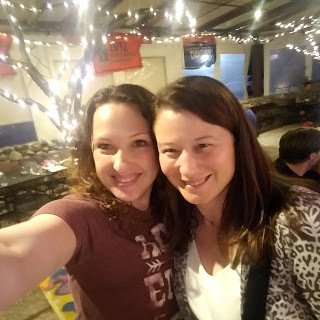 Shan and Kim at a dive only redeemable by its twinkle lights and conversation.
Shan and Kim at a dive only redeemable by its twinkle lights and conversation.
Let me tell you a little bit more about the author herself:
KIM CULBERTSON is the author of the YA novels Songs for a Teenage Nomad (Sourcebooks 2010), Instructions for a Broken Heart (Sourcebooks 2011), which was named a Booklist Top Ten Romance Title for Youth: 2011 and also won the 2012 Northern California Book Award for YA Fiction, Catch a Falling Star (Scholastic 2014), The Possibility of Now (Scholastic 2016), which was named a Bank Street Best Children’s Book of the Year (2017 edition), and The Wonder of Us (Scholastic 2017). Much of her inspiration comes from her background teaching high school since 1997. In 2012, Kim wrote her eBook novella The Liberation of Max McTrue for her students, who, over the years, have taught her far more than she has taught them. Kim lives in Northern California with her husband and daughter.
We'll talk a little about Kim's books on Wednesday, but her dedication as a teacher and her work with the National Writing Project Writers Council are truly inspiring. I can't wait to learn from her this week. So let's get to it.
Today's panel question is:
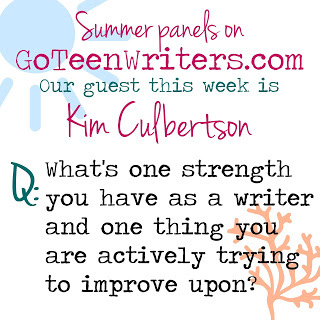
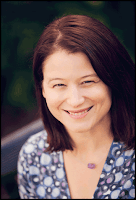 Kim: I feel like my empathy is a big strength; it is essential to my writing – to be able to put myself in my characters' minds and hearts and try to understand why they make the choices they do. But my empathy can also get in the way of writing darker, more innately devious and terrible characters because I always try to believe they see themselves as justified or right and this softens them. I’ve had many readers over the years tell me that I love my characters too much, that I too often see good in people where there isn’t any. I used to feel like, “That’s a good thing!” but I do also see their point. There is a certain naiveté in believing people have good in them when they keep showing us otherwise. And it does keep me from writing truly wicked villains in the way some writers can, but I am coming to grips with that about my work. I prefer the messier, flawed characters who have both good and bad sides to clearly good or bad types of characters. Maybe this is because, for the most part, I have rarely encountered pure villains in my ordinary life. Sometimes people are broken or narcissistic or sheltered, but not evil at their hearts. Flawed people. And, yes, some are more flawed than others. I hope to keep playing with this idea in my future work.
Kim: I feel like my empathy is a big strength; it is essential to my writing – to be able to put myself in my characters' minds and hearts and try to understand why they make the choices they do. But my empathy can also get in the way of writing darker, more innately devious and terrible characters because I always try to believe they see themselves as justified or right and this softens them. I’ve had many readers over the years tell me that I love my characters too much, that I too often see good in people where there isn’t any. I used to feel like, “That’s a good thing!” but I do also see their point. There is a certain naiveté in believing people have good in them when they keep showing us otherwise. And it does keep me from writing truly wicked villains in the way some writers can, but I am coming to grips with that about my work. I prefer the messier, flawed characters who have both good and bad sides to clearly good or bad types of characters. Maybe this is because, for the most part, I have rarely encountered pure villains in my ordinary life. Sometimes people are broken or narcissistic or sheltered, but not evil at their hearts. Flawed people. And, yes, some are more flawed than others. I hope to keep playing with this idea in my future work.
 Steph: I’m excellent at the discipline required to finish a novel. I’m rarely distracted by my messy house or social media. I’m trying to improve on my descriptive language. That’s always been a struggle for me, coming up with ways to prettily and efficiently describe.
Steph: I’m excellent at the discipline required to finish a novel. I’m rarely distracted by my messy house or social media. I’m trying to improve on my descriptive language. That’s always been a struggle for me, coming up with ways to prettily and efficiently describe.
 Jill: I think I’m pretty good at worldbuilding--at creating a place that feels real, sometimes eerily so. I’m always looking to improve my plot structure and pacing. My books often take a while to get going. Perhaps it’s the epic fantasy genre, I don’t know. But I’d love to change that.
Jill: I think I’m pretty good at worldbuilding--at creating a place that feels real, sometimes eerily so. I’m always looking to improve my plot structure and pacing. My books often take a while to get going. Perhaps it’s the epic fantasy genre, I don’t know. But I’d love to change that.
 Shan: I love these answers! I identify with both Steph and Kim regarding empathy and discipline. I know what it takes to get a novel done and I'm not afraid to sit down and do it. The empathy thing can definitely get in the way, but is also so crucial. I think my biggest strength comes in a similar vein to that. I have no qualms crawling into a character's head and working to see the world as they see it. It can be exhausting at times, but it's a real strength.
Shan: I love these answers! I identify with both Steph and Kim regarding empathy and discipline. I know what it takes to get a novel done and I'm not afraid to sit down and do it. The empathy thing can definitely get in the way, but is also so crucial. I think my biggest strength comes in a similar vein to that. I have no qualms crawling into a character's head and working to see the world as they see it. It can be exhausting at times, but it's a real strength.
Like Jill, my greatest weakness is probably structure. My own writing process is so valuable to the creative flow in my head, but it can work against me at times in the structure department. I'm actively working to improve here.
What about you, dear writer? What is one strength you have and one weakness you're working to improve upon?
Please welcome author Kim Culbertson to the blog! I met Kim at an author dinner a few years back and was immediately taken by her smarts. I love hearing her talk about the journey and the craft of writing and I know you'll see exactly what I mean when you read her answers.
 Shan and Kim at a dive only redeemable by its twinkle lights and conversation.
Shan and Kim at a dive only redeemable by its twinkle lights and conversation.Let me tell you a little bit more about the author herself:
KIM CULBERTSON is the author of the YA novels Songs for a Teenage Nomad (Sourcebooks 2010), Instructions for a Broken Heart (Sourcebooks 2011), which was named a Booklist Top Ten Romance Title for Youth: 2011 and also won the 2012 Northern California Book Award for YA Fiction, Catch a Falling Star (Scholastic 2014), The Possibility of Now (Scholastic 2016), which was named a Bank Street Best Children’s Book of the Year (2017 edition), and The Wonder of Us (Scholastic 2017). Much of her inspiration comes from her background teaching high school since 1997. In 2012, Kim wrote her eBook novella The Liberation of Max McTrue for her students, who, over the years, have taught her far more than she has taught them. Kim lives in Northern California with her husband and daughter.
We'll talk a little about Kim's books on Wednesday, but her dedication as a teacher and her work with the National Writing Project Writers Council are truly inspiring. I can't wait to learn from her this week. So let's get to it.
Today's panel question is:

 Kim: I feel like my empathy is a big strength; it is essential to my writing – to be able to put myself in my characters' minds and hearts and try to understand why they make the choices they do. But my empathy can also get in the way of writing darker, more innately devious and terrible characters because I always try to believe they see themselves as justified or right and this softens them. I’ve had many readers over the years tell me that I love my characters too much, that I too often see good in people where there isn’t any. I used to feel like, “That’s a good thing!” but I do also see their point. There is a certain naiveté in believing people have good in them when they keep showing us otherwise. And it does keep me from writing truly wicked villains in the way some writers can, but I am coming to grips with that about my work. I prefer the messier, flawed characters who have both good and bad sides to clearly good or bad types of characters. Maybe this is because, for the most part, I have rarely encountered pure villains in my ordinary life. Sometimes people are broken or narcissistic or sheltered, but not evil at their hearts. Flawed people. And, yes, some are more flawed than others. I hope to keep playing with this idea in my future work.
Kim: I feel like my empathy is a big strength; it is essential to my writing – to be able to put myself in my characters' minds and hearts and try to understand why they make the choices they do. But my empathy can also get in the way of writing darker, more innately devious and terrible characters because I always try to believe they see themselves as justified or right and this softens them. I’ve had many readers over the years tell me that I love my characters too much, that I too often see good in people where there isn’t any. I used to feel like, “That’s a good thing!” but I do also see their point. There is a certain naiveté in believing people have good in them when they keep showing us otherwise. And it does keep me from writing truly wicked villains in the way some writers can, but I am coming to grips with that about my work. I prefer the messier, flawed characters who have both good and bad sides to clearly good or bad types of characters. Maybe this is because, for the most part, I have rarely encountered pure villains in my ordinary life. Sometimes people are broken or narcissistic or sheltered, but not evil at their hearts. Flawed people. And, yes, some are more flawed than others. I hope to keep playing with this idea in my future work.  Steph: I’m excellent at the discipline required to finish a novel. I’m rarely distracted by my messy house or social media. I’m trying to improve on my descriptive language. That’s always been a struggle for me, coming up with ways to prettily and efficiently describe.
Steph: I’m excellent at the discipline required to finish a novel. I’m rarely distracted by my messy house or social media. I’m trying to improve on my descriptive language. That’s always been a struggle for me, coming up with ways to prettily and efficiently describe. Jill: I think I’m pretty good at worldbuilding--at creating a place that feels real, sometimes eerily so. I’m always looking to improve my plot structure and pacing. My books often take a while to get going. Perhaps it’s the epic fantasy genre, I don’t know. But I’d love to change that.
Jill: I think I’m pretty good at worldbuilding--at creating a place that feels real, sometimes eerily so. I’m always looking to improve my plot structure and pacing. My books often take a while to get going. Perhaps it’s the epic fantasy genre, I don’t know. But I’d love to change that.  Shan: I love these answers! I identify with both Steph and Kim regarding empathy and discipline. I know what it takes to get a novel done and I'm not afraid to sit down and do it. The empathy thing can definitely get in the way, but is also so crucial. I think my biggest strength comes in a similar vein to that. I have no qualms crawling into a character's head and working to see the world as they see it. It can be exhausting at times, but it's a real strength.
Shan: I love these answers! I identify with both Steph and Kim regarding empathy and discipline. I know what it takes to get a novel done and I'm not afraid to sit down and do it. The empathy thing can definitely get in the way, but is also so crucial. I think my biggest strength comes in a similar vein to that. I have no qualms crawling into a character's head and working to see the world as they see it. It can be exhausting at times, but it's a real strength. Like Jill, my greatest weakness is probably structure. My own writing process is so valuable to the creative flow in my head, but it can work against me at times in the structure department. I'm actively working to improve here.
What about you, dear writer? What is one strength you have and one weakness you're working to improve upon?
Published on August 27, 2018 04:00
August 24, 2018
When you decided to pursue writing, did the discipline fit neatly into your life? (With Paul Regnier!)
Hi all. Shannon here. I'm sad to report that today is our last day with author, Paul Regnier. If you're on social media, please look him up and tell him THANK YOU for all his time and wisdom this week.
Here are a few places online where you can track him down. We're so grateful, Paul!
Facebook | Twitter | Instagram | Website
And just for giggles, here's that ridiculous promo video Paul, Jill and I did for this past year's Mount Hermon conference. Paul is clearly the star here.
And now, for this week's final panel question.
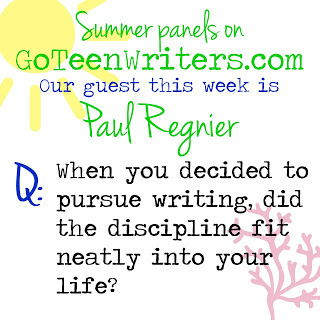
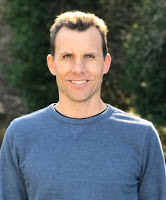 Paul: (Several moments of hearty laughter) I don't think the pursuit of writing fits "neatly" into anyone's life unless they're rich and have all the time in the world to do whatever they want. A dedicated pursuit of writing is a time consuming process. The majority of my professional writing career has been squished and crammed into the scant hours between a full time job, family and friends. Time is always a limited and valuable commodity for writers.
Paul: (Several moments of hearty laughter) I don't think the pursuit of writing fits "neatly" into anyone's life unless they're rich and have all the time in the world to do whatever they want. A dedicated pursuit of writing is a time consuming process. The majority of my professional writing career has been squished and crammed into the scant hours between a full time job, family and friends. Time is always a limited and valuable commodity for writers.
I believe the last statistic I read was that 95% of writers make less than $5000 a year on their book sales. I don't say that to bum out any aspiring writers out there. If anything, it's a call to focus on the foundational motivations for pursuing writing. Namely, because you love it, you feel called to do it, and don't want to stop no matter what.
The secondary motivation would be the career goals to make it profitable enough to support a full-time writing lifestyle. This isn't easy and it takes time. In practical terms, this means you'll probably need to have a day job while you write. This isn't necessarily a bad thing. Plenty of good story ideas can spring from every day work life. And the more you write, the better you get, and the more books you release the higher the odds that they will add up to something substantial. Not just monetarily but impact-wise.
If you feel called to write, your stories might just have the positive impact in someone's life that changes the course of their life for the better. And that's something that no amount of money can equal.
 Jill: It sure didn’t! I had three little ones at home at the time. My son, age three; my daughter, age one; and my friend’s newborn, whom I was babysitting at the time. Life was pretty hectic, and the only time I could write was if Luke was at preschool and the girls were napping at the same time. So maybe only an hour during the day, and a little more at night. It was really hard! And I was new to writing, so I wasn’t very fast. Eventually, I stopped watching my friend’s baby, and my daughter got old enough for preschool too. Then I was able to write for longer periods.
Jill: It sure didn’t! I had three little ones at home at the time. My son, age three; my daughter, age one; and my friend’s newborn, whom I was babysitting at the time. Life was pretty hectic, and the only time I could write was if Luke was at preschool and the girls were napping at the same time. So maybe only an hour during the day, and a little more at night. It was really hard! And I was new to writing, so I wasn’t very fast. Eventually, I stopped watching my friend’s baby, and my daughter got old enough for preschool too. Then I was able to write for longer periods.
 Steph: I’ve been pursuing writing since childhood, so really I built my life around being able to write. It was a major adjustment when we started our family and I had to figure out how to be mom and writer simultaneously, but with the help of grandparents we’ve made it work.
Steph: I’ve been pursuing writing since childhood, so really I built my life around being able to write. It was a major adjustment when we started our family and I had to figure out how to be mom and writer simultaneously, but with the help of grandparents we’ve made it work.
 Shan: Nope. I had a three month old and a four year old when I decided to sit down and write my first novel. I did it late at night and early in the morning and during nap times. We were heading a youth ministry and, at one point, I also had to head back to work because we needed more income. I simply made do with the time I had. It might take forever to write a novel this way, but the time is going to pass anyway, right? Why not fill it with a hobby you love and that could one day turn into a career that brings you creative satisfaction? It's always going to be hard. And you're never going to have enough time. But that hasn't stopped the rest of us. It shouldn't stop you.
Shan: Nope. I had a three month old and a four year old when I decided to sit down and write my first novel. I did it late at night and early in the morning and during nap times. We were heading a youth ministry and, at one point, I also had to head back to work because we needed more income. I simply made do with the time I had. It might take forever to write a novel this way, but the time is going to pass anyway, right? Why not fill it with a hobby you love and that could one day turn into a career that brings you creative satisfaction? It's always going to be hard. And you're never going to have enough time. But that hasn't stopped the rest of us. It shouldn't stop you.
What do you say? Does writing fit into your life neatly? Or do you have to fight to make space for it?
Here are a few places online where you can track him down. We're so grateful, Paul!
Facebook | Twitter | Instagram | Website
And just for giggles, here's that ridiculous promo video Paul, Jill and I did for this past year's Mount Hermon conference. Paul is clearly the star here.
And now, for this week's final panel question.

 Paul: (Several moments of hearty laughter) I don't think the pursuit of writing fits "neatly" into anyone's life unless they're rich and have all the time in the world to do whatever they want. A dedicated pursuit of writing is a time consuming process. The majority of my professional writing career has been squished and crammed into the scant hours between a full time job, family and friends. Time is always a limited and valuable commodity for writers.
Paul: (Several moments of hearty laughter) I don't think the pursuit of writing fits "neatly" into anyone's life unless they're rich and have all the time in the world to do whatever they want. A dedicated pursuit of writing is a time consuming process. The majority of my professional writing career has been squished and crammed into the scant hours between a full time job, family and friends. Time is always a limited and valuable commodity for writers. I believe the last statistic I read was that 95% of writers make less than $5000 a year on their book sales. I don't say that to bum out any aspiring writers out there. If anything, it's a call to focus on the foundational motivations for pursuing writing. Namely, because you love it, you feel called to do it, and don't want to stop no matter what.
The secondary motivation would be the career goals to make it profitable enough to support a full-time writing lifestyle. This isn't easy and it takes time. In practical terms, this means you'll probably need to have a day job while you write. This isn't necessarily a bad thing. Plenty of good story ideas can spring from every day work life. And the more you write, the better you get, and the more books you release the higher the odds that they will add up to something substantial. Not just monetarily but impact-wise.
If you feel called to write, your stories might just have the positive impact in someone's life that changes the course of their life for the better. And that's something that no amount of money can equal.
 Jill: It sure didn’t! I had three little ones at home at the time. My son, age three; my daughter, age one; and my friend’s newborn, whom I was babysitting at the time. Life was pretty hectic, and the only time I could write was if Luke was at preschool and the girls were napping at the same time. So maybe only an hour during the day, and a little more at night. It was really hard! And I was new to writing, so I wasn’t very fast. Eventually, I stopped watching my friend’s baby, and my daughter got old enough for preschool too. Then I was able to write for longer periods.
Jill: It sure didn’t! I had three little ones at home at the time. My son, age three; my daughter, age one; and my friend’s newborn, whom I was babysitting at the time. Life was pretty hectic, and the only time I could write was if Luke was at preschool and the girls were napping at the same time. So maybe only an hour during the day, and a little more at night. It was really hard! And I was new to writing, so I wasn’t very fast. Eventually, I stopped watching my friend’s baby, and my daughter got old enough for preschool too. Then I was able to write for longer periods.
 Steph: I’ve been pursuing writing since childhood, so really I built my life around being able to write. It was a major adjustment when we started our family and I had to figure out how to be mom and writer simultaneously, but with the help of grandparents we’ve made it work.
Steph: I’ve been pursuing writing since childhood, so really I built my life around being able to write. It was a major adjustment when we started our family and I had to figure out how to be mom and writer simultaneously, but with the help of grandparents we’ve made it work.
 Shan: Nope. I had a three month old and a four year old when I decided to sit down and write my first novel. I did it late at night and early in the morning and during nap times. We were heading a youth ministry and, at one point, I also had to head back to work because we needed more income. I simply made do with the time I had. It might take forever to write a novel this way, but the time is going to pass anyway, right? Why not fill it with a hobby you love and that could one day turn into a career that brings you creative satisfaction? It's always going to be hard. And you're never going to have enough time. But that hasn't stopped the rest of us. It shouldn't stop you.
Shan: Nope. I had a three month old and a four year old when I decided to sit down and write my first novel. I did it late at night and early in the morning and during nap times. We were heading a youth ministry and, at one point, I also had to head back to work because we needed more income. I simply made do with the time I had. It might take forever to write a novel this way, but the time is going to pass anyway, right? Why not fill it with a hobby you love and that could one day turn into a career that brings you creative satisfaction? It's always going to be hard. And you're never going to have enough time. But that hasn't stopped the rest of us. It shouldn't stop you.What do you say? Does writing fit into your life neatly? Or do you have to fight to make space for it?
Published on August 24, 2018 04:00
August 22, 2018
What would you do if you had a story idea you loved but was outside your genre? (With Paul Regnier!)
We have Paul Regnier with us again (hooray!) and today, I get to show you all his books.
Currently, Paul has a series out with Enclave Publishing. It's called the Space Drifters series and you'll have to pop over to his website for summaries and details of the second two because I don't want to spoil things, but here's the summary for book one and I have to show you his covers. They're spectacular.
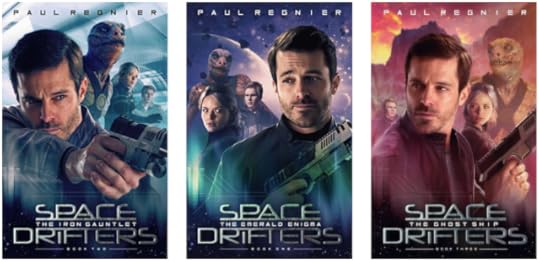
Space Drifters: The Iron Gauntlet Captain Glint Starcrost is not having the carefree, adventurous life the space academy brochures promised star pilots.
Broke, with an unreliable star freighter and a bounty on his head, Glint is desperate enough to try anything. Even set out on a quest to find a fabled good luck charm, the Emerald Enigma.
Now for a crew. A passive aggressive ship computer, a peaceable alien warrior, and time-traveling teen from the past aren’t what he had in mind. But they’ll have to do.
The Emerald Enigma won’t wait forever and neither will the bounty hunter tracking him.
If you're a fan of Guardians of the Galaxy, these books are right up your alley. Definitely give them a look.
And now! For today's panel question:
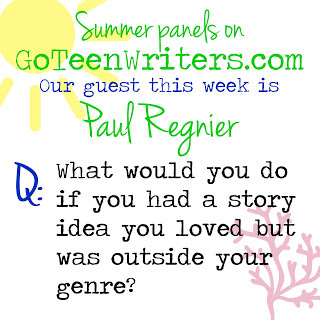
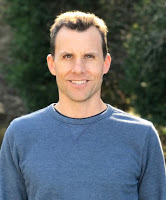 Paul: I'd write it. This question is timely since that's exactly what I'm doing right now. I recently released the last book in my sci-fi trilogy, Space Drifters, and now I'm working on a two book series that would be classified as supernatural/paranormal comedy.
Paul: I'd write it. This question is timely since that's exactly what I'm doing right now. I recently released the last book in my sci-fi trilogy, Space Drifters, and now I'm working on a two book series that would be classified as supernatural/paranormal comedy.
The "smart/safe" thing for an aspiring writer to do is to write for a specific genre, build a group of readers that love that genre, and stick with it, slowly building your readership over time. But then, who embarks on a writing career looking for the "smart/safe" thing? Writing isn't exactly a recipe for financial success. But when inspiration strikes outside of your genre, what can you do? Ignoring inspiration and taking the "smart path" is death to the true creative tale bubbling inside of you.
My advice is to write what inspires you and pursue the story you feel passionate about and let the chips fall where they may.
 Jill: I’d write it. Or I’d at least write down the idea and give it a folder in my file cabinet. There have been times where I’ve taken and idea and switched its genre. This happened to me with The Safe Lands. I’d originally wanted that to be a medieval fantasy series, but my publisher at the time was only interested in dystopian, so I took some time to brainstorm whether or not the idea would work in another setting and found that it did.
Jill: I’d write it. Or I’d at least write down the idea and give it a folder in my file cabinet. There have been times where I’ve taken and idea and switched its genre. This happened to me with The Safe Lands. I’d originally wanted that to be a medieval fantasy series, but my publisher at the time was only interested in dystopian, so I took some time to brainstorm whether or not the idea would work in another setting and found that it did.
 Steph: This has only happened to me once, with The Lost Girl of Astor Street. It worked out that my contemporary YA titles had never really taken off, so finding a new genre to write it was a smart career move. If it happened to me again, I suppose I would publish under a pen name.
Steph: This has only happened to me once, with The Lost Girl of Astor Street. It worked out that my contemporary YA titles had never really taken off, so finding a new genre to write it was a smart career move. If it happened to me again, I suppose I would publish under a pen name.
 Shan: I love each of these answers because it's a true glimpse into different facets of the industry. Paul's right. It's safest to do one thing and do it until you excel at it and have an audience built. But even the safe thing doesn't always pan out. My advice is always to consider what kind of author you want to be and aim for that. I want to be an author who has the freedom to move around a bit and write what I'm passionate about. How that unravels in each career may look different, but I don't know how you can stifle an idea that must be written now. I suppose if you can stifle it, it wasn't meant to be just then. Perhaps the passion wasn't hot enough. But if you're burning with the need to write an idea, my guess is you'll do it. There won't be an excuse big enough to keep you from it.
Shan: I love each of these answers because it's a true glimpse into different facets of the industry. Paul's right. It's safest to do one thing and do it until you excel at it and have an audience built. But even the safe thing doesn't always pan out. My advice is always to consider what kind of author you want to be and aim for that. I want to be an author who has the freedom to move around a bit and write what I'm passionate about. How that unravels in each career may look different, but I don't know how you can stifle an idea that must be written now. I suppose if you can stifle it, it wasn't meant to be just then. Perhaps the passion wasn't hot enough. But if you're burning with the need to write an idea, my guess is you'll do it. There won't be an excuse big enough to keep you from it.
And you? What would you do if you had a story idea you loved but it was outside your usual genre?
Currently, Paul has a series out with Enclave Publishing. It's called the Space Drifters series and you'll have to pop over to his website for summaries and details of the second two because I don't want to spoil things, but here's the summary for book one and I have to show you his covers. They're spectacular.

Space Drifters: The Iron Gauntlet Captain Glint Starcrost is not having the carefree, adventurous life the space academy brochures promised star pilots.
Broke, with an unreliable star freighter and a bounty on his head, Glint is desperate enough to try anything. Even set out on a quest to find a fabled good luck charm, the Emerald Enigma.
Now for a crew. A passive aggressive ship computer, a peaceable alien warrior, and time-traveling teen from the past aren’t what he had in mind. But they’ll have to do.
The Emerald Enigma won’t wait forever and neither will the bounty hunter tracking him.
If you're a fan of Guardians of the Galaxy, these books are right up your alley. Definitely give them a look.
And now! For today's panel question:

 Paul: I'd write it. This question is timely since that's exactly what I'm doing right now. I recently released the last book in my sci-fi trilogy, Space Drifters, and now I'm working on a two book series that would be classified as supernatural/paranormal comedy.
Paul: I'd write it. This question is timely since that's exactly what I'm doing right now. I recently released the last book in my sci-fi trilogy, Space Drifters, and now I'm working on a two book series that would be classified as supernatural/paranormal comedy. The "smart/safe" thing for an aspiring writer to do is to write for a specific genre, build a group of readers that love that genre, and stick with it, slowly building your readership over time. But then, who embarks on a writing career looking for the "smart/safe" thing? Writing isn't exactly a recipe for financial success. But when inspiration strikes outside of your genre, what can you do? Ignoring inspiration and taking the "smart path" is death to the true creative tale bubbling inside of you.
My advice is to write what inspires you and pursue the story you feel passionate about and let the chips fall where they may.
 Jill: I’d write it. Or I’d at least write down the idea and give it a folder in my file cabinet. There have been times where I’ve taken and idea and switched its genre. This happened to me with The Safe Lands. I’d originally wanted that to be a medieval fantasy series, but my publisher at the time was only interested in dystopian, so I took some time to brainstorm whether or not the idea would work in another setting and found that it did.
Jill: I’d write it. Or I’d at least write down the idea and give it a folder in my file cabinet. There have been times where I’ve taken and idea and switched its genre. This happened to me with The Safe Lands. I’d originally wanted that to be a medieval fantasy series, but my publisher at the time was only interested in dystopian, so I took some time to brainstorm whether or not the idea would work in another setting and found that it did.
 Steph: This has only happened to me once, with The Lost Girl of Astor Street. It worked out that my contemporary YA titles had never really taken off, so finding a new genre to write it was a smart career move. If it happened to me again, I suppose I would publish under a pen name.
Steph: This has only happened to me once, with The Lost Girl of Astor Street. It worked out that my contemporary YA titles had never really taken off, so finding a new genre to write it was a smart career move. If it happened to me again, I suppose I would publish under a pen name.
 Shan: I love each of these answers because it's a true glimpse into different facets of the industry. Paul's right. It's safest to do one thing and do it until you excel at it and have an audience built. But even the safe thing doesn't always pan out. My advice is always to consider what kind of author you want to be and aim for that. I want to be an author who has the freedom to move around a bit and write what I'm passionate about. How that unravels in each career may look different, but I don't know how you can stifle an idea that must be written now. I suppose if you can stifle it, it wasn't meant to be just then. Perhaps the passion wasn't hot enough. But if you're burning with the need to write an idea, my guess is you'll do it. There won't be an excuse big enough to keep you from it.
Shan: I love each of these answers because it's a true glimpse into different facets of the industry. Paul's right. It's safest to do one thing and do it until you excel at it and have an audience built. But even the safe thing doesn't always pan out. My advice is always to consider what kind of author you want to be and aim for that. I want to be an author who has the freedom to move around a bit and write what I'm passionate about. How that unravels in each career may look different, but I don't know how you can stifle an idea that must be written now. I suppose if you can stifle it, it wasn't meant to be just then. Perhaps the passion wasn't hot enough. But if you're burning with the need to write an idea, my guess is you'll do it. There won't be an excuse big enough to keep you from it.And you? What would you do if you had a story idea you loved but it was outside your usual genre?
Published on August 22, 2018 04:00
August 20, 2018
How do you keep track of story ideas? (With Paul Regnier!)
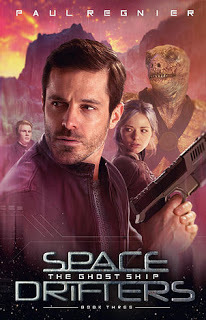 We have a new week to celebrate and, with it, a new author!
We have a new week to celebrate and, with it, a new author! Friends, please welcome author Paul Regnier to the blog. Over the past year, I've had a chance to get to know him a little bit and he's such a fantastic soul with so much great advice.
This past spring, Jill and I teamed up with Paul to teach the Teen Track at Mount Hermon and he was such a steady, level-headed, wise addition that I can't help patting Jill on the back for looping him into our maniacal plans. We had a fantastic time.
On top of that, the third book in his science fiction series just released, and you guys have got to check these books out.
But more on his books Wednesday. Today, let's learn a little about Paul himself.
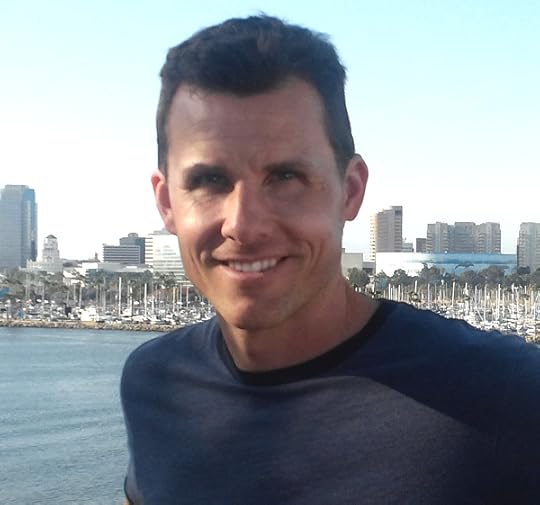 Paul Regnier is the author of the Space Drifters science fiction series. He is a technology junkie, drone pilot, photographer, web designer, drummer, Star Wars nerd, recovering surfer, coffee snob and a wannabe Narnian with a fascination for all things futuristic.
Paul Regnier is the author of the Space Drifters science fiction series. He is a technology junkie, drone pilot, photographer, web designer, drummer, Star Wars nerd, recovering surfer, coffee snob and a wannabe Narnian with a fascination for all things futuristic. Paul grew up in Orange County, CA and now lives in Treasure Valley, ID with his wife and two children. To connect with Paul Regnier and discover the full extent of his nerdhood, please visit his pages on Facebook and Twitter.
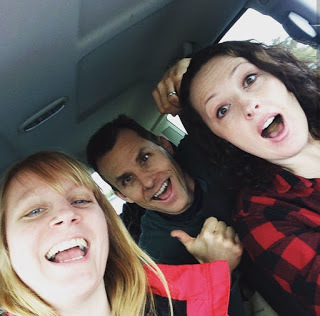 Paul Regnier surrounded by two gals who talk way too fast.
Paul Regnier surrounded by two gals who talk way too fast.I don't know if it's his Narnian cravings or if it's the Star Wars thing, but the three of us got along really well and I'm so grateful he's agreed to join us this week.
So, let's get to it. Monday's panel question is:
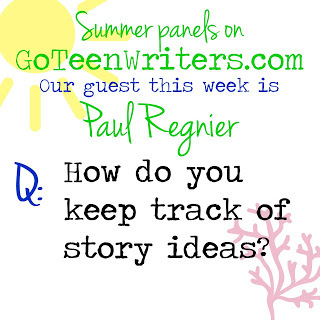
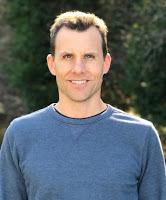 Paul: I've learned, through the pain of lost "great ideas," to jot them down as soon as they come to me. Post-its, napkins, receipts, any scrap of paper that's handy and occasionally, the notes app on my iphone. I always think I'll remember them later but sure enough, if I don't write them down during the moment of inspiration, they often fly out the window never to be heard from again.
Paul: I've learned, through the pain of lost "great ideas," to jot them down as soon as they come to me. Post-its, napkins, receipts, any scrap of paper that's handy and occasionally, the notes app on my iphone. I always think I'll remember them later but sure enough, if I don't write them down during the moment of inspiration, they often fly out the window never to be heard from again. For the larger ideas, the "high concept" type of story origin motivators, these generally stick around in my brain. These are the ones I slowly build upon, day by day, building the details over the skeleton of a concept. I don't usually write these down, unless there's specific scenes that really shine, so that I can really stretch and play with the overall story idea before I write it down.
Basically, I write down anything specific and scene related while I allow the larger story idea and plot to roll around in my head for weeks or months until it forms something solid that I feel deserves an honest "sit down and write" kind of session. The reason being, I don't want to cement the foundation before the blueprints form a structure worth building.
 Jill: I have a file cabinet filled with folders. Anytime I get a new idea, I’ll brainstorm on paper and put those notes into a manila file folder. That way I have a place to put more sheets of inspiration that might come to me, and the ideas will all be right there waiting for me to give them more attention. If I draw a map, it goes in the folder. If I’m really excited about the idea, I’ll make a file folder for it on my computer and start writing. I’ll also make a story bible file in Word, in which I start adding character names, research links, and any other pertinent information.
Jill: I have a file cabinet filled with folders. Anytime I get a new idea, I’ll brainstorm on paper and put those notes into a manila file folder. That way I have a place to put more sheets of inspiration that might come to me, and the ideas will all be right there waiting for me to give them more attention. If I draw a map, it goes in the folder. If I’m really excited about the idea, I’ll make a file folder for it on my computer and start writing. I’ll also make a story bible file in Word, in which I start adding character names, research links, and any other pertinent information.
 Shan: First of all, I'm thoroughly impressed (and not at all surprised) that Jill has an ACTUAL file cabinet for story ideas. Second, my system has evolved to be more user friendly than it was when I first started writing and I think it's normal for this to happen, so don't worry if you haven't got a handle on this yet. I used to try to keep notebooks for each story and folders on my computer with story ideas in them. But these days, I just whip out my cell phone whenever I have a story idea and I type it into an email draft and there it stays until I decide to pull it out and play with it. Currently, there are 48 ideas waiting on me in my 'Drafts' folder.
Shan: First of all, I'm thoroughly impressed (and not at all surprised) that Jill has an ACTUAL file cabinet for story ideas. Second, my system has evolved to be more user friendly than it was when I first started writing and I think it's normal for this to happen, so don't worry if you haven't got a handle on this yet. I used to try to keep notebooks for each story and folders on my computer with story ideas in them. But these days, I just whip out my cell phone whenever I have a story idea and I type it into an email draft and there it stays until I decide to pull it out and play with it. Currently, there are 48 ideas waiting on me in my 'Drafts' folder.

Steph: Your systems are all WAY better than mine. Mine is lame and ineffective. I jot it down in Google Keep and then I frequently forget about it until I happen to be scrolling through my archives.
Note from Shan: I often forget about my ideas as well, so I have to frequent my 'Drafts' folder on occasion, but that's what it's there for. To remember all the amazing things I'm destined to forget.
Now, you tell us! How do YOU keep track of your story ideas?
Published on August 20, 2018 04:00
August 17, 2018
Why do you write books for young people? (With J.C. Cervantes!)
Hi all! Shannon here, saying goodbye to another week and another lovely author, J.C. Cervantes. You've been fabulous, friend. Thank you for joining us.
If you're on social media, please give her a visit and tell her how grateful we are that she stopped by the blog to share her stories and her wisdom. You can find Jen here:
Facebook | Twitter | Instagram | Website
We've talked about her upcoming release, The Storm Runner , but be sure to take a look at Jen's award-winning debut novel, Tortilla Sun . That cover makes me want to fly!
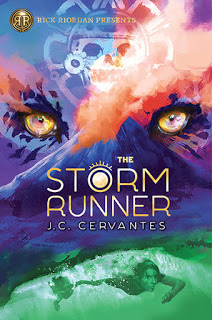
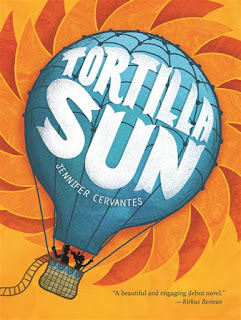
Today's panel question is:
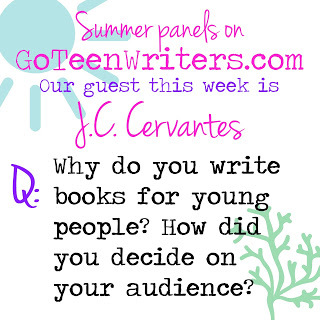
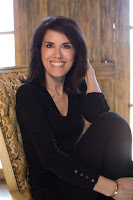 Jen: Childhood is the time of imagination and mystery. Of dragons and monsters. Of first loves and magic spells. But truth be told, I didn’t “decide” per se. The universe tapped me on the shoulder and I answered. Once I wrote my first kids’ book, I knew something magical and rare had happened, something that would change me forever. Plus, I really love magic and monsters!
Jen: Childhood is the time of imagination and mystery. Of dragons and monsters. Of first loves and magic spells. But truth be told, I didn’t “decide” per se. The universe tapped me on the shoulder and I answered. Once I wrote my first kids’ book, I knew something magical and rare had happened, something that would change me forever. Plus, I really love magic and monsters!
 Steph: I don’t know, honestly. I’ve tried writing for adults a few times, and I really struggle with it. Even though I’m a legit adult and it doesn’t seem like it would be that hard. There’s just something about the untapped potential of the teenage years that draws me.
Steph: I don’t know, honestly. I’ve tried writing for adults a few times, and I really struggle with it. Even though I’m a legit adult and it doesn’t seem like it would be that hard. There’s just something about the untapped potential of the teenage years that draws me.
 Jill: My husband and I were working in youth ministry at the time, so I was around a lot of teenagers. I have always gravitated toward the readers and shared books with them, so when I started writing, that was the only age that interests me. I have since written books for kids and some for adults, but I am still partial to the teen years. There is something about discovering life and adventure for the first time that makes a story more interesting to me.
Jill: My husband and I were working in youth ministry at the time, so I was around a lot of teenagers. I have always gravitated toward the readers and shared books with them, so when I started writing, that was the only age that interests me. I have since written books for kids and some for adults, but I am still partial to the teen years. There is something about discovering life and adventure for the first time that makes a story more interesting to me.
 Shan: I get asked this question a lot. And so sometimes I feel like a broken record when I answer it, but the truth is just as powerful and just as true as when I first started writing for teens.
Shan: I get asked this question a lot. And so sometimes I feel like a broken record when I answer it, but the truth is just as powerful and just as true as when I first started writing for teens.
One of the most inspiring things to watch is when a person, any person, rises up to face their fears and instead of being swallowed by them like they have a zillion times before, they ball up their fist and punch fear square in the face. Fear may steal things from us from time to time, but I don't believe we have to let it win. Those teenage years are so full of angst and growth and trials and grappling and coming into your own. It's the ideal place to examine the fight and the superiority of a soul that says, "I'm afraid, but I'm doing it anyway." Stories that capture the genuine spirit of this set me weeping and cheering. I want to write those stories.
Now it's your turn.Tell us, how did you decide on your audience?
If you're on social media, please give her a visit and tell her how grateful we are that she stopped by the blog to share her stories and her wisdom. You can find Jen here:
Facebook | Twitter | Instagram | Website
We've talked about her upcoming release, The Storm Runner , but be sure to take a look at Jen's award-winning debut novel, Tortilla Sun . That cover makes me want to fly!


Today's panel question is:

 Jen: Childhood is the time of imagination and mystery. Of dragons and monsters. Of first loves and magic spells. But truth be told, I didn’t “decide” per se. The universe tapped me on the shoulder and I answered. Once I wrote my first kids’ book, I knew something magical and rare had happened, something that would change me forever. Plus, I really love magic and monsters!
Jen: Childhood is the time of imagination and mystery. Of dragons and monsters. Of first loves and magic spells. But truth be told, I didn’t “decide” per se. The universe tapped me on the shoulder and I answered. Once I wrote my first kids’ book, I knew something magical and rare had happened, something that would change me forever. Plus, I really love magic and monsters!  Steph: I don’t know, honestly. I’ve tried writing for adults a few times, and I really struggle with it. Even though I’m a legit adult and it doesn’t seem like it would be that hard. There’s just something about the untapped potential of the teenage years that draws me.
Steph: I don’t know, honestly. I’ve tried writing for adults a few times, and I really struggle with it. Even though I’m a legit adult and it doesn’t seem like it would be that hard. There’s just something about the untapped potential of the teenage years that draws me. Jill: My husband and I were working in youth ministry at the time, so I was around a lot of teenagers. I have always gravitated toward the readers and shared books with them, so when I started writing, that was the only age that interests me. I have since written books for kids and some for adults, but I am still partial to the teen years. There is something about discovering life and adventure for the first time that makes a story more interesting to me.
Jill: My husband and I were working in youth ministry at the time, so I was around a lot of teenagers. I have always gravitated toward the readers and shared books with them, so when I started writing, that was the only age that interests me. I have since written books for kids and some for adults, but I am still partial to the teen years. There is something about discovering life and adventure for the first time that makes a story more interesting to me. Shan: I get asked this question a lot. And so sometimes I feel like a broken record when I answer it, but the truth is just as powerful and just as true as when I first started writing for teens.
Shan: I get asked this question a lot. And so sometimes I feel like a broken record when I answer it, but the truth is just as powerful and just as true as when I first started writing for teens. One of the most inspiring things to watch is when a person, any person, rises up to face their fears and instead of being swallowed by them like they have a zillion times before, they ball up their fist and punch fear square in the face. Fear may steal things from us from time to time, but I don't believe we have to let it win. Those teenage years are so full of angst and growth and trials and grappling and coming into your own. It's the ideal place to examine the fight and the superiority of a soul that says, "I'm afraid, but I'm doing it anyway." Stories that capture the genuine spirit of this set me weeping and cheering. I want to write those stories.
Now it's your turn.Tell us, how did you decide on your audience?
Published on August 17, 2018 04:00

